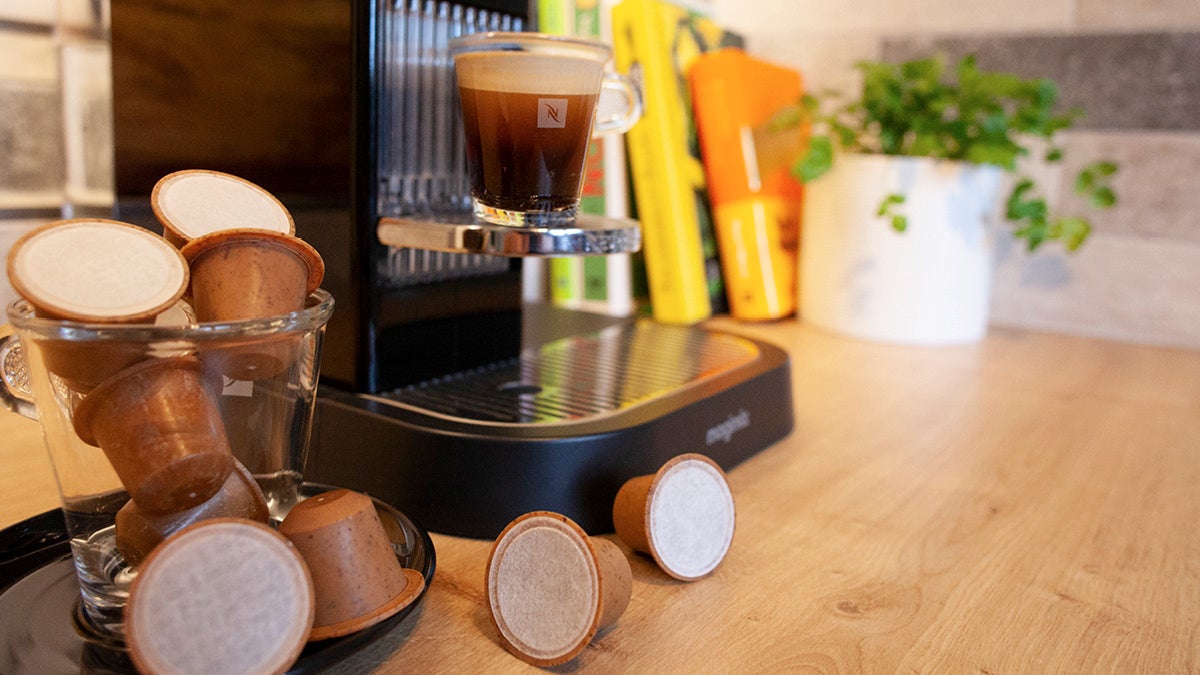
‘Bio-’ is a buzzword. Whether it’s applied to foods, fuel, tech or plastic, the prefix resonates with companies and consumers alike. But it can also be confusing in the case of plastic packaging, as the use of biomaterial doesn’t guarantee that the product is biodegradable or compostable.
Finding a truly sustainable alternative to single-use plastic for disposable items such as coffee capsules was a difficult task for the Coda Group. In fact, the Netherlands-based pioneer in biomaterial manufacturing found it so hard that it had to create its own solely natural product: Solinatra.
Solinatra is a 100% plant-based alternative to plastic that is home-compostable, requiring no additives or special conditions. It will simply degrade in soil, just like a banana skin on a compost heap. Solinatra is not only green, though – it is market-ready.
When it comes to scaling up eco-innovations for commercial application, the Coda Group’s manufacturing expertise is what makes Solinatra a serious prospect for mass-market disruption, according to its CEO, Robert de Jong.
“We know the industry and the challenges it faces,” he says. “So we’ve developed Solinatra as a truly sustainable alternative with practical manufacturing interests in mind from day one. It is viable, competitive and ready for brands to use.”
The problem Solinatra tackles is both big and small at the same time: microplastics.
The environmental impact of microplastics
Even most bioplastics don’t actually biodegrade. Instead, they break down into tiny fragments. Millions of these pieces of plastic enter our oceans each day, joining the trillions that already contaminate the entire marine ecosystem. Nearly all of them are microplastics – fragments shorter than 5mm.
Such pollution is evident on the land and even in the air too. Microplastics have been found in the human food chain – contained in vegetables and even salt – and they can also be detected inside people’s bodies.
Solinatra uses a circular solution to material sourcing that remains natural and renewable
Much as the contamination problem is complex, the manufacturing solution is deceptively simple, according to Dr Daniel Lynch, Coda Group’s chief sustainability officer.
“What doesn’t go in can’t come out,” he says. “Made from plant-based ingredients such as rapeseed agricultural waste, Solinatra contains no fossil-fuel-based plastic. It breaks down into compost that’s safe to use on your garden. Zero compromise in production means zero risk of pollution.”
From farm to compostable fork
In sustainability terms, using agricultural waste as a natural feedstock also answers the question of how the biological element is sourced.
Growing crops exclusively for biomaterial would be so inefficient that the numbers could never add up, not least because of the sheer amount of land it would demand. An area equivalent to 35 million football pitches for growing sugar cane would be needed to replace all the polythene in the world with biobased material, which would still not degrade naturally in any case. It would also require mountains of fertiliser and lakes of water.
By recycling rapeseed, wheat or another of the broad range of patented crop wastes instead, Solinatra uses a circular solution to material sourcing that remains natural and renewable, while actively supporting farmers.
This makes the material sustainable for a large-scale roll-out to replace single-use plastics in pharmaceutical packaging, including blister packs; food packaging, such as cup lids; and disposable cutlery and straws. Solinatra will soon be available in Nespresso-compatible coffee capsules, for instance.
This level of mainstreaming calls for industry-wide collaboration to solve a global problem, concludes Simon Girdlestone, Coda Group’s chief marketing and sales officer.
“As an industry, we have the power to turn the tide on single-use plastics,” he says. “We urgently need to collaborate to tackle the microplastics problem, so we invite manufacturers and brands to work with us worldwide to realise this transition to truly
sustainable solutions.”
For more information please visit Coda Group
Promoted by Coda Group

'Bio-’ is a buzzword. Whether it’s applied to foods, fuel, tech or plastic, the prefix resonates with companies and consumers alike. But it can also be confusing in the case of plastic packaging, as the use of biomaterial doesn’t guarantee that the product is biodegradable or compostable.
Finding a truly sustainable alternative to single-use plastic for disposable items such as coffee capsules was a difficult task for the Coda Group. In fact, the Netherlands-based pioneer in biomaterial manufacturing found it so hard that it had to create its own solely natural product: Solinatra.
Solinatra is a 100% plant-based alternative to plastic that is home-compostable, requiring no additives or special conditions. It will simply degrade in soil, just like a banana skin on a compost heap. Solinatra is not only green, though – it is market-ready.

